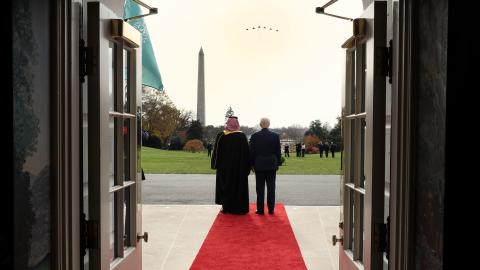If you thought the heated political atmosphere would cool after voters made their decision, think again. If anything, the tone of political life has turned nastier. Democrats know they can't persuade electors that Hillary really is a better choice than The Donald, but they hope to make enough noise to de-legitimize Trump and weaken his presidency. And by pinning Clinton's defeat on the Russians, FBI director James Comey, Huma Abedin & Anthony Weiner, and the electoral college system created by our Founding Fathers, perhaps sets the stage for a Clinton run in 2020, when she will be the same age as Ronald Reagan when he began his second term.
Far-fetched? Perhaps. But while Trump was on an ego trip to rallies around the country, ostensibly to thank his voters, Clinton was throwing a lavish thank-you dinner for the biggest of her big donors (antagonizing the merely big, uninvited ones) at the Plaza Hotel (no longer owned by Donald Trump). A marker, in the event that 2020 looks like an easy win after a disastrous Trump term?
Democrats are also hoping to use the senate confirmation process to derail one or two of president-elect Trump's appointments. Failing that, they hope to so damage the nominees' reputations that they will be too wounded politically to push through the policies Trump has in mind.
Republicans hold a two-seat majority in the senate, the arena in which the confirmation battles will be fought. In the case of Rex Tillerson, the ExxonMobil CEO slated to be Secretary of State, that might not be enough. Republican senators Marco Rubio, Lindsey Graham, and John McCain say they are troubled by Tillerson's close association with Vladimir Putin, whom McCain calls "a butcher, a murderer and a thug." Tillerson negotiated several lucrative deals with Putin and received Russia's Order of Friendship, one of the highest honors conferred on a foreigner. Trump sees the relationship between Tillerson and Putin as a plus for his planned tilt to a pro-Russian policy. That might include recognition of Russia's land grabs in Ukraine and Crimea, and relaxation of sanctions, which Tillerson opposed and which are delaying completion of billions of dollars of ExxonMobil deals. In return, Trump would look for a Putin promise to keep hands off NATO countries, and perhaps a medal for our new president. Complaints by our European allies, who Trump charged won't pay for their own defense but announced yesterday they are stepping up such spending, and the suddenly tough-on-Russia Democrats who didn't complain very much when Obama refused to provide any military help to Ukraine, would be frosting on Trump's cake.
That's the sort of big deal that Trump believes makes life worth living. Another would come from Trump's intended use of America's support of Taiwan as a bargaining chip when negotiating a new trade deal with China -- which must make the Taiwanese more than a little nervous.
It's easy to criticize Trump for appointing a businessman, rather than a paid-up member of the foreign policy establishment, to run the State Department. Easy, unless you consider what the establishment has done over the past eight years. Turned control of the sea lanes in Asia to China; allowed Putin to become the key player in the Middle East as a partner to Assad, who Obama promised to depose; watched as Iran converted Iraq into a client state; and more. Perhaps a period of disestablishment of the policy elites is in order. Throw in the pleasure Trump might have had from naming Tillerson after stringing supplicant Mitt Romney along, and the appointment of the oil executive makes real sense.
Last week, Democrats, responding to their environmentalist constituency, prepared to attack not only Tillerson, but all of Trump's nominees who will have a hand in shaping energy policy.
* Rick Perry, former governor of oil-producing Texas but also a fan of wind power, will run the Energy Department, which is in charge of research into renewable sources of energy and our nuclear arsenal, and handing out money to capitalists who like to venture with taxpayer money;
* Scott Pruit, attorney general of Oklahoma, will head the Environmental Protection Agency, the 15,000 employee-environmentalists who create and preside over regulations related to carbon emissions.
* Ryan Zinke, a Montana congressman and former navy SEAL commander, will run the Interior Department, which oversees energy exploration on public lands and offshore, and wants the government to retain ownership of those lands but allow more intensive mining and drilling.
Tillerson, who will negotiate international climate-change agreements, has moved from climate-change skepticism to support for a carbon tax and the Paris accord. That should please the greens, but won't: to them, a life lived in the oil industry can only result in eternal damnation. Perry, Pruitt, and Zinke all say the science of climate change is far from settled, doubts intolerable to true believers without a trace of doubt in their minds, to borrow from Neil Diamond. They take no comfort from the fact that the man who appointed this quartet, who once called climate change "a hoax", now says he is open-minded. Credit for prying his mind open goes to Ivanka, his rather liberal daughter, who undoubtedly loves her father but nevertheless subjected him to a meeting with Al Gore.
Trump knows, or will soon learn, that Obama has won his war on coal: no one will make a 40-year investment in a mine simply because the new president has promised to revive an industry that cannot compete with natural gas. But with the energy-policy Fab Four of Tillerson, Perry, Pruitt, and Zinke in place, and with oil prices ticking up, we can expect:
* an increase in fracking activity,
* relaxation of restrictions on drilling in offshore areas and on government lands,
* pressure from Perry's Department of Energy for congressional funding of the Yucca Mountain facility for handling nuclear waste, which might revive the emissions-free but high-cost nuclear industry.
That energy-policy revolution is only one of the massive changes heralded by Trump's election. Representative Tom Price, who will head Health and Human Services, is an acknowledged expert in the second part of Trump's "repeal and replace" plans for Obamacare. Out is the idea that consumers need the government to intervene between them and their doctors. In will come a variety of measures to create a functioning market in which consumers will have a wide range of choice of insurance plans, with special protection for those with disability or in need of financial help in order to afford insurance.
The intensity of Price's battle to reform health care will be matched by the one to be fought by Betsy DeVos, incoming Secretary of Education. DeVos is an advocate of what she calls "transformational change"—unfortunately similar to Obama's use of that phrase to describe his plans for the entire American nation—to maximize parental choice, which means going to war with the teachers' unions and their financial dependents in the Democratic Party.
Then there is Dr. Ben Carson, brought up in a tough neighborhood of Detroit, chosen to run Housing and Urban Development. He has already been attacked for having no managerial experience (HUD has about 10,000 employees), and will face more virulent attacks when he attempts to replace failed LBJ War-on-Poverty policies that have created the sink holes that are some neighborhoods in cities such as Baltimore and Chicago. Carson hopes to develop programs that will reduce dependency and associated ills, including shooting up on drugs and down of innocents caught in the crossfire of drug-fueled gangs.
Andrew Puzder, chosen to head the Department of Labor, comes with a taste for policies that are almost the exact opposite of those in force. He opposes increasing the minimum wage, or heaping mandatory benefits on low-paid employees, and favors automation in franchised fast-food operations, one of which he currently heads. He told one interviewer, machines are "always polite, they always upsell, they never take a vacation, they never show up late, there's never a slip-and-fall, or an age, sex, or race discrimination case." In short, the Labor Department will no longer play its traditional role as defender of what progressives believe to be the rights of employees.
The upcoming confirmation hearings will clarify the extent and depth of the policy differences between a Trump-controlled Republican Party and a progressive-controlled Democratic Party. As they should. Next comes Trump's nomination to fill the vacant seat on the Supreme Court. That lifetime appointee will be chosen to tilt a more-or-less evenly split court in conservatives' favor, including on social issues near and dear to progressive hearts, the beating of which quicken when discussion turns to the toilet privileges of selected groups rather than boring stuff such as the disappearance of the jobs of deplorables. The battle over the Supreme Court nominee promises to make the cabinet-confirmation wars seem like minor skirmishes.
















